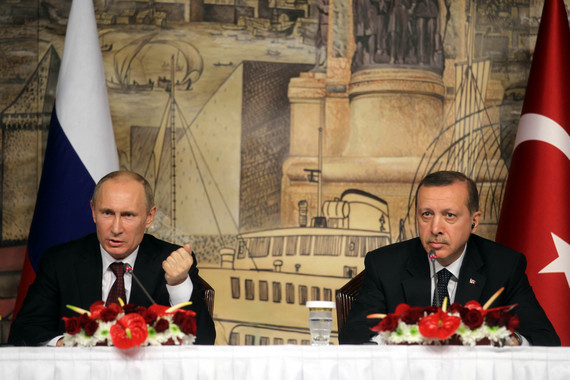Downing of a Russian warplane by Turkish jets on the Turkish-Syrian border has provided an enabling environment for Russian President Vladimir Putin to polish his image. Increasingly sharp rhetoric from the Russian side has two primary goals: To avoid hard military action and prop up the Russian leader.
Russia has unleashed massive anti-Turkey propaganda right after Turkish jets shot down the Russian warplane for apparently violating Turkish airspace for 17 seconds. Russians were outraged over the downing of their warplane, a rare event for a major power such as Russia and huge humiliation for Putin.
Putin has so far uttered such harsh words against Turkey that one would guess the incident is in fact a casus belli and Moscow is bracing for a major offensive. "I will never forget it," Putin said this week, after vowing that Turkey will pay for the "huge mistake." Prime Minister Dmitry Medvedev and Foreign Minister Sergey Lavrov have also been confrontational against Turkey, accusing it of involving in an oil business with ISIS. Medvedev even said the incident is a cause of war, but Moscow decided not to retaliate "symmetrically."
While Russian rhetoric exacerbated the already strained ties, Turkey has repeatedly signaled a desire to come to an understanding. Further confrontation between two powerful neighbors, historical foes-turned-friends, runs the risk of spiraling out of control and is a cause for concern. Will the two countries go to war?
Hardly is there a major reason why Russia would go to fight such a powerful country like Turkey, also a NATO member. The Russian sabre-rattling is nothing but a way to cover its inability to fully retaliate against Turkey in similar terms. Turkey is, after all, a member of the world's most powerful security alliance, built particularly to contain Russia against its aggression.
Putin is frequently testing NATO's resolve in protecting its members. His warplanes often violate airspace of other NATO members in the Baltics and elsewhere. Turkey's prompt military response to an insignificant violation of its airspace enraged and surprised Moscow. A calculating pragmatist, the jet incident humiliated the ex-KGB agent who publicly mourned the collapse of the Soviet Union.
Russian pro-government media has kicked off a large-scale, round-the-clock smear campaign against Turkey, fanning anti-Turkish sentiments that is deeply ingrained in the memory of the Russian people. Putin, the political alchemist, asked tourism companies to cancel trips and ordered a decree to ban any Turkish player to sign with a Russian club.
Despite Russia's own economic travail, Moscow imposed a series of sanctions on Turkey, the ones that would not hurt much. The major area of cooperation is on the sphere of energy and possible sanctions on the sale of natural gas could put Turkey in dire situation. Turkish leaders visited Qatar and Azerbaijan last week, major natural gas suppliers, to make sure that they have alternative sources in the unlikely event that Gazprom, Russia's state-run gas giant, halts the flow of natural gas to Turkey. This week, President Erdogan is scheduled to visit Turkmenistan, another natural gas supplier. We are yet to see if Turkmenistan could provide natural gas to Turkey without Moscow's blessing.
Putin wants to make sure that Turkey, as a member of NATO, pay the price for its mistake. To the delight of Russian nationalists, Putin has increasingly catered to his conservative base and indulged their sentiments. Feeding his popularity through anti-Western rhetoric, confrontation with Turkey came as a windfall at a time when Putin was trying to sell the war in Russia.
Until today, lucrative trade deals and economic partnership ensured that two countries remain silent to each other's domestic and foreign adventures. For the sake of this mutually benefiting trade, Turkey had treated Russian aggression in Georgia and Ukraine with benign neglect. Even in Syria, where Turkey and Russia have played to different horses, Putin and Erdogan did not publicly bash each other. Russia's increasing bombardment of rebels forces in and around Aleppo set the stage for a jet incident, drawing Moscow's ire.
The serious acrimony and war of words between the two countries raised concerns if the two countries are bracing for a wider war. The ties have declined precipitously, but there is a little sign that any military confrontation could somehow benefit the sides in any way.
Putin will do some yelling and impose several mild sanctions to save face at home. No matter to what extend Moscow sharpens its tongue, Ankara is primarily focused on deescalating the situation, at the advise of its NATO allies.
Media war against Turkey is obviously designed to polish Putin's image. Do not hold your breath for the worse.
